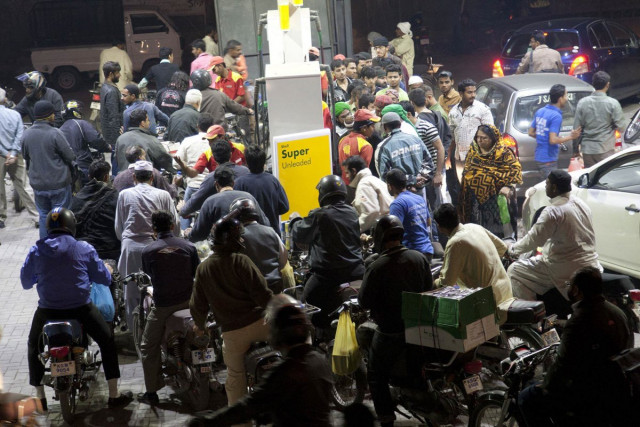Stop the blame game on petrol
Perhaps, the govt is unaware of this fact, but longer it waits to make tough decisions, more expensive they will get

Do they not realise that the people of Pakistan do not care who started the petrol crisis. PHOTO: MOHAMMAD SAQIB/EXPRESS
It all started on January 18 when Interior Minister Chaudhry Nisar Ali Khan admitted that the government was responsible and implied that at least some of his cabinet colleagues might share the blame. Finance Minister Ishaq Dar joined the game a day later, strongly hinting that he felt that the crisis was solely the responsibility of the petroleum minister and the power minister. On January 21, the water and power ministry spokesperson felt the need to come out and spout an incoherent and disingenuous defence of his ministry’s performance in the entire matter. What is disturbing about this intra-cabinet squabble is that it is effectively the same as the arguments made by little children fighting on a playground: ‘He started it!’
Are these people truly our elected representatives? Do they not realise that the people of Pakistan do not care who started the petrol crisis. They do not make the distinction between the finance ministry’s payments of tariff differentials or the ability of the country’s largest oil company to import fuel. All they care about is that when they go to their local petrol pumps, they had to wait for several hours in lines that sometimes stretched for hundreds of yards. For that colossal failure of policy, they will blame the entire government and will punish the entire ruling party. Indeed, the whole finger-pointing mentality is what started the whole crisis in the first place. Energy is a complicated, interconnected web that requires delicate handling and sound, long-term policymaking. Yet, we appear to have the exact opposite: discrete government departments making haphazard policies with a very short-term horizon in mind.
Instead of long-term investments in cheap, clean and reliable energy sources that would enhance our future growth prospects, we got expensive subsidies on current consumption that eviscerates hope for the future for the sake of the present. Instead of intelligent planning based on forward-thinking projections of relative prices of fuel sources, we got spur-of-the-moment decisions that built infrastructure with multi-decade lifespans. And instead of a crackdown on electricity theft, we got subsidies that hide the true cost of the pilferage. No wonder the entire energy supply chain can grind to a screeching halt over the smallest of disruptions.
Perhaps, the government is unaware of this fact, but the longer it waits to make the tough decisions, the more expensive they will get. Electricity theft appears to be getting even more rampant under the Nawaz Administration than it was under the serially inept Zardari Administration, with the state-owned power companies collecting less of their bills this year than last year. Whatever happened to Water and Power Minister Khawaja Muhammad Asif’s promised crackdown? What happened to Mr Dar’s Economic Reforms and Implementation Unit at the finance ministry that was supposed to craft a long-term solution to the problem? And what happened to the petroleum ministry’s promise to deregulate prices? The cabinet may be arguing about who was responsible for this catastrophe, but the people of Pakistan have a longer view of who is responsible. They do not care who started the crisis. They want to know who will end it.
Published in The Express Tribune, January 25th, 2015.
Like Opinion & Editorial on Facebook, follow @ETOpEd on Twitter to receive all updates on all our daily pieces.














COMMENTS
Comments are moderated and generally will be posted if they are on-topic and not abusive.
For more information, please see our Comments FAQ